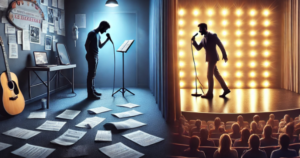 The Power of Rehearsal in Stand-Up Comedy
The Power of Rehearsal in Stand-Up Comedy
One of the things I know beyond a shadow of a doubt about most people who are trying to learn how to be a comedian is that they simply either don’t rehearse, don’t rehearse enough, or don’t rehearse properly before a performance.
This single factor can keep a comedian from progressing quickly and being able to generate the big laughs on stage in a much shorter time frame.
Follow the Pros
Every single professional performance artist (other than most comedians) spends a lot of time rehearsing—and for good reason.
What most folks don’t realize is that before a tour, a band will spend months rehearsing daily to prepare for that tour. They begin by developing the setlist and then move on to performing full shows—coordinating the lights, special effects, and even planning what they’ll say between songs.
Needless to say, rehearsal is a huge deal for anyone who wants to learn how to be a comedian and command those big laughs on stage as quickly as possible.
Here’s what you need to know about rehearsal and its potential impact on your stand-up comedy act:
Proper and ample rehearsal before a show can literally make the difference between bombing on stage or killing it.
Why Most New Comedians Struggle
Unfortunately, the only time many new comedians actually “rehearse” is when they’re already standing in front of an audience.
(Note: This is one of the major reasons why it takes so long for a comedian to develop a high-level stand-up act that entertains audiences and gets them noticed by people who can help move their career forward.)
During these performances, they stumble over words, forget key parts of their act, rely too heavily on notes, and lack the confidence needed to engage with the audience. Worse still, they appear disconnected from their material.
This is a surefire recipe for getting little to no laughter from the crowd—and, quite frankly, it’s painful to watch.
Stage Time Is Precious
Stage time is always at a premium for comedians, especially when they’re first starting out.
It makes perfect sense that a new comedian should want to maximize the benefit of every performance opportunity.
But this can only be achieved through effective rehearsal—and that’s why it’s critical for each comedian to ensure their act is as polished as possible before they step onto the stage.
The Three Critical Aspects of Rehearsal
There are three vital reasons why every comedian should embrace rehearsal before delivering their stand-up material to an audience:
- It gives the appearance of spontaneity: When you rehearse, your material comes across as though it’s just popping into your head naturally as you speak, giving the audience a feeling of spontaneity and making the performance feel more authentic.
- It aligns body language with material: Proper rehearsal allows your delivery to match how you naturally speak and express yourself. This alignment creates a powerful connection between you and your audience, making your performance seem fluid and genuine.
- It removes variables from the equation: Here’s a big one—proper rehearsal eliminates many of the variables that can prevent you from knowing just how funny your material really is. The funniest material in the world can be killed by poor, sloppy delivery. But if your delivery is flawless, then you know it’s the material itself that needs refining.
Wrap-Up: Rehearse to Kill
Effective rehearsal is one of the most powerful tools a comedian has if they truly want to kill it on stage. But it’s not enough to just rehearse—you need to make sure you’re doing it the right way.
In the Killer Stand-up Online Course, rehearsal is broken down into two distinct phases:
Phase 1: Initial Rehearsal
In this phase, your material might still need some work. Punchlines may need to be added, adjusted, or even removed. S
et-up lines might need tweaking. During this phase, the goal is to refine and tighten your material until it’s as polished as possible.
Phase 2: Professional Rehearsal
Once your material is solid, the focus shifts to committing it to memory. This phase is all about maximizing the laughter power of your routine and ensuring your material is delivered perfectly.
Make no mistake—there are some very specific techniques you can use to get the most benefit out of every rehearsal session.
As your material becomes more solid and consistently gets laughs, you’ll spend less rehearsal time on it and focus more on developing new material.
This shift will allow you to hone your craft even further, ensuring that your performances only get better over time.
Bottom Line
For anyone serious about learning how to be a successful comedian, proper rehearsal is non-negotiable.
Don’t make the mistake of thinking you can wing it or that rehearsing in front of an audience is enough.
Rehearse properly before you perform—it’s the difference between a mediocre performance and one that leaves the audience in stitches.
